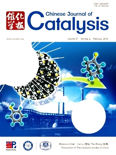
Chinese Journal of Catalysis
metrics 2024
Advancing Catalytic Science for a Sustainable Future
Introduction
Welcome to the Chinese Journal of Catalysis, a prestigious publication dedicated to advancing the field of catalysis. Published by Elsevier, this journal showcases groundbreaking research and developments in the chemistry of catalysis, emphasizing applications that address global challenges in energy, environment, and sustainability. Since its inception in 1996, the journal has gained recognition, achieving a remarkable impact factor and ranking in the top quartile (Q1) of both Catalysis and Chemistry disciplines as of 2023. With a Scopus ranking of #5 in Catalysis and #14 in General Chemistry, it serves as a vital resource for academia and industry professionals alike. Through its rigorous peer-review process, the journal disseminates high-quality research that not only fosters collaboration among scientists but also encourages innovation. Access to the journal is available through institutional subscriptions, ensuring wide-reaching dissemination of critical findings. Positioned within the vibrant research community in China and beyond, the Chinese Journal of Catalysis plays a pivotal role in shaping the future of catalytic science.
Metrics 2024
 -
- 15.70
15.70 11.50
11.50 -
-Metrics History
Rank 2024
IF (Web Of Science)
JCI (Web Of Science)
Quartile History
Similar Journals
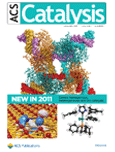
ACS Catalysis
Transforming Ideas into Catalytic SolutionsACS Catalysis, published by the American Chemical Society, stands as a premier journal in the field of catalysis, offering a vital platform for researchers, professionals, and students focused on advancing the science of catalysis and its applications. With an impressive impact factor placing it in the Q1 category for both Catalysis and Chemistry (miscellaneous), this journal has established itself as a leading source of high-quality research findings, currently ranking #21 out of 408 in General Chemistry and #9 out of 68 in Catalysis according to Scopus. Since its inception in 2011, ACS Catalysis has aimed to publish innovative research that addresses the critical challenges in catalytic processes, advancing our understanding of both fundamental and applied aspects of catalysis. With a commitment to promoting open scientific discourse, it serves a vital role for those interested in the latest methodologies, discoveries, and trends in this essential discipline. Based in Washington, DC, ACS Catalysis continues to uphold the highest standards of scholarship and collaboration within the vibrant community of chemists and engineers worldwide.
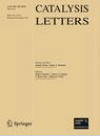
CATALYSIS LETTERS
Driving Progress in Catalytic Research and DevelopmentCATALYSIS LETTERS, published by Springer, is a distinguished journal dedicated to presenting original research and review articles in the field of catalysis and its various applications. Serving the scientific community since 1988, this journal has continuously evolved, providing a platform for the dissemination of innovative findings that advance the understanding and development of catalytic processes. With an esteemed Q3 ranking in Catalysis and a Q2 ranking in miscellaneous Chemistry for 2023, CATALYSIS LETTERS underscores its relevance and impact within these critical fields. Although it does not offer open access, the journal remains a crucial resource for researchers, professionals, and students seeking to stay updated on contemporary advancements and discussions in catalysis. Its Scopus rankings further affirm its contribution to general chemistry and chemical engineering, making it an essential publication for those immersed in this dynamic area of study.
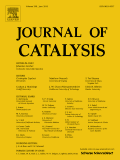
JOURNAL OF CATALYSIS
Shaping the Future of Catalysis Through ResearchJOURNAL OF CATALYSIS, published by Academic Press Inc, Elsevier Science, is a premier peer-reviewed journal that has been at the forefront of research in catalysis since its inception in 1962. With an impressive impact factor and ranking in the top quartiles of both catalysis and physical and theoretical chemistry, the journal is highly regarded, currently holding the distinction of Q1 in both fields. The journal serves as a critical platform for disseminating groundbreaking research, innovative methodologies, and theoretical advancements, making it essential reading for researchers, professionals, and students alike. Although it does not operate under an open-access model, its robust content is accessible through institutional subscriptions, ensuring that significant findings in catalysis and related fields reach a wide audience. With convergence years extending to 2024, JOURNAL OF CATALYSIS continues to shape the discourse in catalysis and chemical engineering, encouraging scholarly exchange and collaboration worldwide.
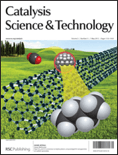
Catalysis Science & Technology
Driving Innovation in Chemical EngineeringCatalysis Science & Technology is a leading journal published by the Royal Society of Chemistry, dedicated to advancing the field of catalysis through high-quality research and innovation. Established in 2011, this journal serves as a vital platform for researchers, professionals, and students interested in the latest developments in chemical engineering and catalytic processes. With an impressive Q2 ranking in Catalysis for 2023, the journal is recognized for its significant contributions to the discipline, evidenced by its respectable Scopus Rank of #21 out of 68 in the category and a 69th percentile standing. The journal is committed to disseminating original research that enhances our understanding of catalysis, facilitating knowledge exchange and collaboration within the scientific community. Even without Open Access, Catalysis Science & Technology remains pivotal in shaping innovations that drive forward both academic inquiry and industrial applications, making it an essential resource for anyone involved in this dynamic field.

CATALYSIS SURVEYS FROM ASIA
Transforming Chemistry with Cutting-edge Catalysis SurveysCATALYSIS SURVEYS FROM ASIA, published by Springer/Plenum Publishers, is a vital resource in the ever-evolving field of catalysis and chemistry. With a dedication to publishing innovative research and reviews from 2002 to 2024, this journal serves as a platform for the dissemination of significant findings that enhance our understanding of catalytic processes and their applications. Although its current impact factor is not explicitly listed, the journal holds a commendable Q3 ranking in Catalysis and Q2 ranking in Miscellaneous Chemistry within the prestigious Scopus database, indicating its relevance and quality among its peers. Open access options ensure that a broader audience can benefit from the research published, fostering collaboration and advancement in the field. By bridging the gaps between academic research and practical applications, CATALYSIS SURVEYS FROM ASIA is indispensable for researchers, professionals, and students committed to pushing the boundaries of catalytic science and technology.

TOPICS IN CATALYSIS
Catalyzing Progress in Chemical SciencesTOPICS IN CATALYSIS is a renowned journal published by SPRINGER/PLENUM PUBLISHERS, dedicated to advancing the field of catalysis and its applications in chemistry and chemical engineering. With its ISSN 1022-5528 and E-ISSN 1572-9028, this journal has been a critical resource since its inception in 1994, encompassing a wide range of research topics and recent advancements within the realm of catalysis, including both fundamental studies and practical applications. As of 2023, it holds a prestigious Q3 ranking in Catalysis and a Q2 ranking in miscellaneous chemistry, reflecting its impact and relevance in the academic community. With a Scopus rank of #128 in General Chemistry and #38 in Catalysis, TOPICS IN CATALYSIS is positioned to be a key contributor to the ongoing dialogue in these fields, fostering innovation and collaboration. While not an open-access journal, it provides institutional access options, ensuring that the latest findings and methodologies are available to researchers, professionals, and students worldwide. This journal is essential for those looking to stay at the forefront of catalysis research and its transformative potential in science and industry.
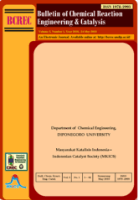
Bulletin of Chemical Reaction Engineering and Catalysis
Empowering Scholars in Chemical Engineering and CatalysisBulletin of Chemical Reaction Engineering and Catalysis is a distinguished open-access journal published by UNIV DIPONEGORO, focusing on pivotal advancements in the fields of chemical reaction engineering and catalysis. Since its inception in 2008, this journal has served as a vital platform for disseminating cutting-edge research, catering to a diverse readership that includes researchers, professionals, and students in chemical engineering and related disciplines. With its dedication to publishing valuable insights, the journal has been indexed in Scopus and boasts respectable rankings across various categories, including Q3 in Chemical Engineering (miscellaneous) and Q4 in Catalysis as of 2023. It continues to foster scholarly dialogue and collaboration by providing an accessible means for contributors to share their findings. Operating from Semarang, Indonesia, this journal underscores its commitment to advancing knowledge in chemical sciences, making it an essential resource for those engaged in the study and application of chemical processes.

ACS Organic & Inorganic Au
Exploring the Intersection of Organic and Inorganic ChemistryACS Organic & Inorganic Au, published by the American Chemical Society, stands as a premier open-access journal dedicated to advancing the fields of organic and inorganic chemistry. Since its inception in 2021, this journal has swiftly risen to prominence, achieving a commendable Q1 classification in Inorganic Chemistry, Organic Chemistry, and Physical and Theoretical Chemistry as of 2023. With an ISSN of 2694-247X, it provides a vital platform for researchers, professionals, and students to disseminate their findings and engage with cutting-edge work across converged disciplines. Operating from its headquarters in Washington, DC, ACS Organic & Inorganic Au is committed to fostering a collaborative research environment, encouraging rigorous peer review, and ensuring the wide accessibility of high-quality scholarly articles. With its open-access model, readers worldwide can freely access and utilize research findings, promoting a global exchange of knowledge crucial for driving innovation in chemistry.
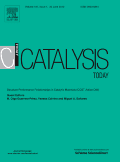
CATALYSIS TODAY
Transforming Ideas into Impactful ResearchCATALYSIS TODAY is an esteemed journal published by Elsevier, specializing in the vibrant field of catalysis and its applications in chemical engineering. With the ISSN 0920-5861 and E-ISSN 1873-4308, it has continually contributed valuable research since its inception in 1987 and is set to maintain its influence through 2025. Hailing from the Netherlands, this journal stands out with a notable Q2 quartile ranking in catalysis and a Q1 ranking in miscellaneous chemistry as of 2023, reflecting its rigorous selection of impactful and innovative studies. Its Scopus rankings further substantiate its excellence, highlighting its position in the 89th percentile of general chemistry and 77th percentile in catalysis. CATALYSIS TODAY aims to disseminate cutting-edge findings, fostering exchange among researchers, professionals, and students in the catalysis community. By presenting high-quality research articles, reviews, and case studies, it plays a pivotal role in advancing knowledge and sparking discussions that drive future developments in the field.
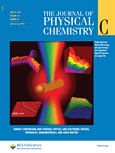
Journal of Physical Chemistry C
Driving excellence in surfaces, coatings, and films.The Journal of Physical Chemistry C, published by the American Chemical Society, stands as a pivotal resource in the realm of materials science and physical chemistry. With an impact factor reflecting its esteemed reputation, this journal showcases high-quality research spanning topics such as electronic, optical, and magnetic materials, as well as nanoscience and nanotechnology. Hailing from the United States, it operates without an open access model, yet its contributions are critical for advancing our understanding of surfaces, coatings, and films. Notably, the journal is classified in Quartile 1 (Q1) for several categories, underscoring its prominence in Physical and Theoretical Chemistry and related fields. Researchers, professionals, and students alike will find value in the comprehensive discussions and innovative research trends presented. The scholarly articles published from 2007 to 2024 not only drive forward scientific inquiry but also inform practical applications in various industries, making this journal an essential tool for anyone committed to excellence in the sciences.